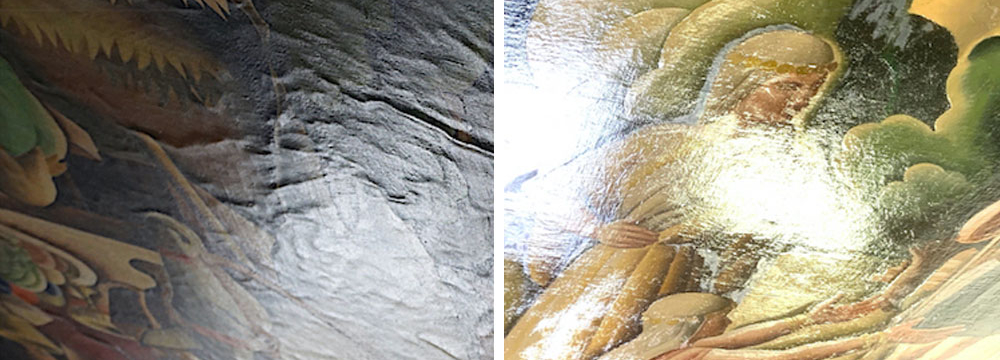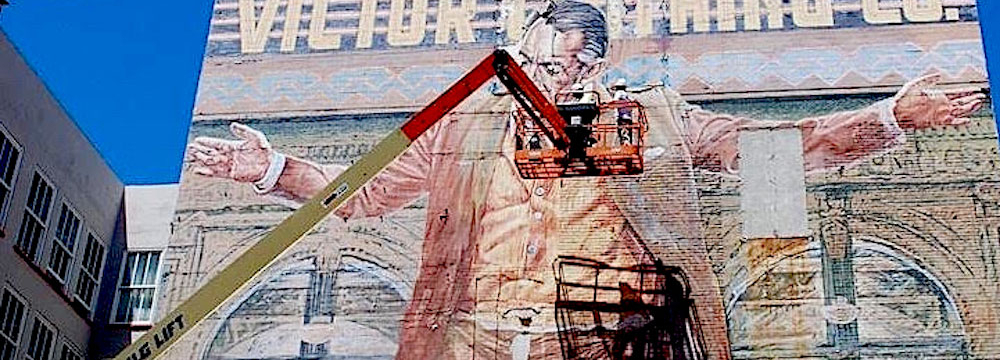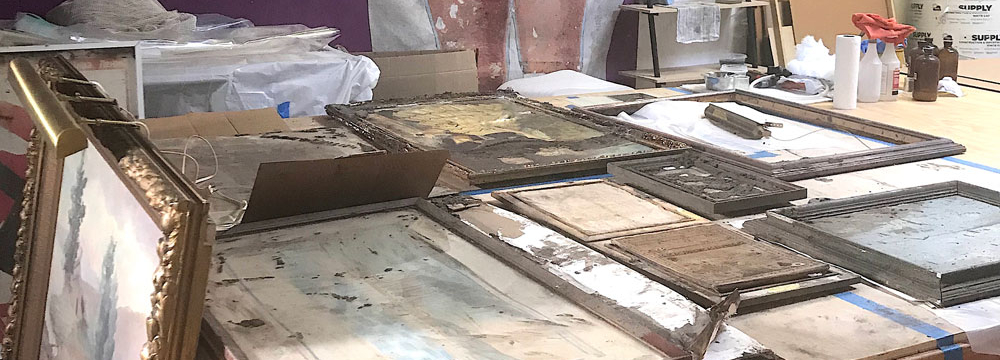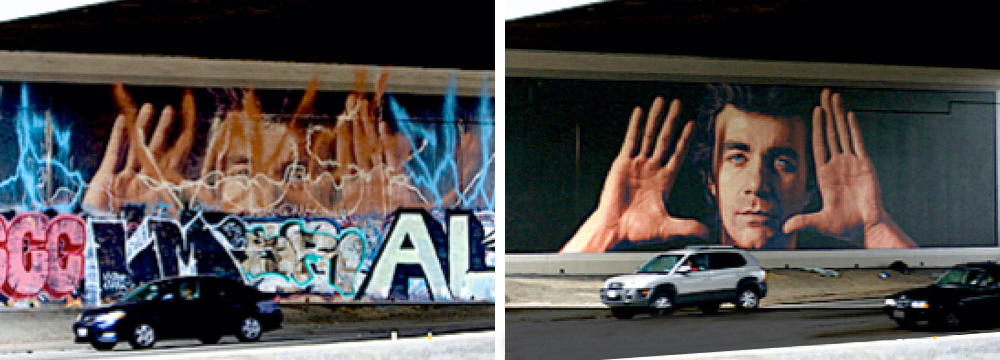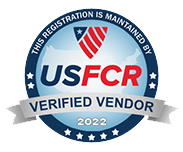As an experienced art conservator, my work often leads me on a journey through Las Vegas, where I have engaging discussions about the process of painting repair and the repair process. People most often come to me to repair artwork, whether the problem is a ripped painting, unsightly cracks, or even mold. These conversations often take me to people’s homes and offices. There, I have the privilege of examining artworks and advising on the restoration. It’s an honor to act as a bridge between past and present generations. Recently, I had the honor of consulting on a family’s ancestral portrait.
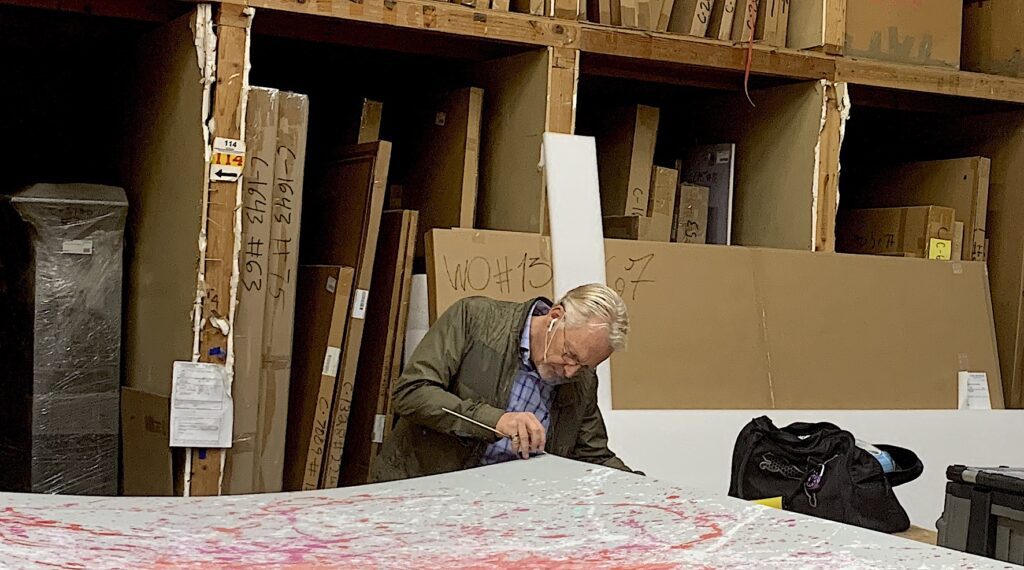
A contemporary abstract painting belonging to a private collector needed some TLC before being taken out of storage and put on exhibition.
Heirlooms and artworks serve as living conduits to bygone eras. They allow us to reconnect with our roots, remember loved ones, and share tales of our ancestors with future generations. Yet, a common question arises, especially when these items change hands through generations: Is it truly worth restoring them? Can something be priceless when it seemingly holds no monetary value? How do we decide what to save and protect among our possessions?
Understanding the worth of these family treasures requires a multi-dimensional perspective. One must consider the tangible financial value, the intangible emotional value, and the historical significance that each piece might embody. It becomes particularly rewarding when the emotional and historical ties to an item intersect with its intrinsic artistic value. This amalgamation of factors influences the decision-making process of painting restoration and preservation.
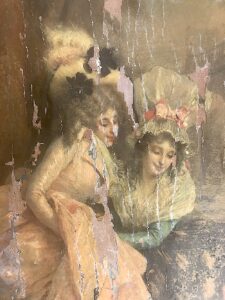
A truly heartbreaking situation but a result of a very stupid collector who shipped this gorgeous, high quality, valuable artwork with little protection. The glass broke and then slid around in the packing which broke up the paint layers. We could have stabilized and done painting restoration to this to look perfect, preserving its beauty and some of its value but the collector didn’t want to spend the money and I think they threw it away!!
The key factor that often tips the scales in favor of restoration is the condition of the artwork. Oil paintings, like other forms of art, can suffer the effects of time and environmental factors. This leads to issues such as rip damage, discolored varnishes, and flaking paint. Addressing these concerns through meticulous painting conservation and art restoration can breathe new life into an artwork, allowing it to continue narrating its story for generations to come.
In the realm of art conservation, we recognize that value extends beyond the appraisal of an artwork. Value includes narratives that the art carries, the emotions it evokes, and the connections it fosters across generations. Thus, the question of whether an heirloom or artwork is “worth” restoring finds its answer in the profound appreciation of its multifaceted significance, ensuring that it remains an enduring beacon of familial history and artistic legacy.
A recent experience of an heirloom painting repair in Las Vegas, Nevada, exemplifies the sentiment of preserving familial legacies with painting restoration. In this instance, a family entrusted us with the care of the treasures accumulated over the years by their parents as their family expanded. These objects held not only physical attributes but also a trove of cherished memories. It was an honor to engage in the preservation, restoration, and support of this family’s commitment to their heritage by tending to a diverse collection of nearly two dozen items. If you’d like to chat or ask questions about our art conservation services in Las Vegas, call (702) 757-3820.
This is a quick testimonial of our heirloom restoration services.
Here is our webpage for other testimonials about painting restoration and more. Scroll down the page… I think you’ll find several of the examples interesting and entertaining:
https://www.FineArtConservationLab.com/testimonials
Fine Art Conservation Laboratories’ 45 years of expertise in preserving and restoring art offers invaluable help and practical knowledge for helping people through the insurance claim process for damaged collectibles and art pieces. Our experienced team understands the complexities of insurance claims related to art, heirlooms, and antiques, providing reports that are properly prepared with information that the insurance company never puts in doubt. Fine Art Conservation Laboratories charges flat fees for this work, not a percentage of the claim settlement, and our expertise is honored nationwide. Let us help make the art, heirloom, and collectible part of the insurance claim process as seamless as possible and preserve your peace of mind.
This blog post has been syndicated at ExpertClick.com. What does it mean that this article is “ syndicated”?
It’s a bit of a coup to get an article syndicated, and it’s certainly prestigious, as additional “proof” that the info and the author are considered far and wide authoritative and an expert in the field. So, enjoy and trust our content!! This article was syndicated for USA national redistribution.
When something is published, usually by a news source, and is made available through different venues for redistribution then it is said to be syndicated. Publications that are syndicated are usually considered of value as being from an expert, educational, new worthy or valuable for wide popular interest. See syndication page at the renowned publicity site: https://www.expertclick.com/NRWire/
This website’s syndication included:
1) Included in the ExpertClick Press Room as a ‘press release.’ (different than a ‘news release’)
2) Included in the ‘Speaker Bureau Platform Page.’
3) Shown on the front page of ExpertClick, in rotation with other most recent posts.
4) Shown in the ‘News Release Results page.’
5) Included on optimized for searches on all my topics of expertise.
6) Shown via RSS linked from the Press Room. (A specific way news is actively distributed within the industry)
7) Shown in the full RSS feed from ExpertClick. (Another, different specific way news is actively distributed within the industry)
8) Syndicated to LexisNexis.com As of 2006, the company had the world’s largest electronic database for legal and public-records related information, distributor of academic content and expert opinion.
This article has been syndicated at https://www.expertclick.com/NRWire/



